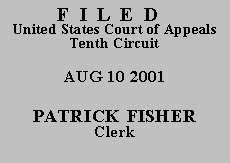 PUBLISH
PUBLISH
 PUBLISH
PUBLISH
UNITED STATES COURT OF APPEALS
TENTH CIRCUIT
| ALBERT C. MCDONALD, | |
| v. | No. 99-6223 |
| CARL S. SCHREINER, III, D.D.S.;
CARL S. SCHREINER, III, D.D.S. INC.,
Defendants.
CONTINENTAL CASUALTY
COMPANY, A Foreign Corporation,
Garnishee-Appellee. |
APPEAL FROM THE UNITED STATES DISTRICT COURT
FOR THE WESTERN DISTRICT OF OKLAHOMA
(D.C. No. 98-CV-938-L)
Submitted on the briefs:
Scott G. Robelen, Oklahoma City, Oklahoma, and Shawn D. Fulkerson of Fulkerson & Fulkerson, Oklahoma City, Oklahoma,
for Plaintiff-Appellant.W. Michael Hill and Roger N. Butler, Jr., of Secrest, Hill & Folluo, Tulsa, Oklahoma
, for Garnishee-Appellee.
Before BALDOCK and McWILLIAMS, Circuit Judges, and SHADUR,(*) District Judge.(**)
BALDOCK, Circuit Judge.
In 1998, Plaintiff Albert C. McDonald obtained a judgment in state court against Defendants, Dentist Carl S. Schreiner III and his business, in the amount of $1,135,000 for dental malpractice. The judgment also provided for an additional $237,300 in prejudgment interest pursuant to Okla. Stat. tit. 12, § 727. At the time of the judgment, Continental Casualty Company insured Defendants pursuant to a professional liability policy with a liability limit of $1,000,000. Plaintiff subsequently garnished the proceeds of the policy. Thereafter, Plaintiff, Defendants, and Continental entered into a settlement agreement. Pursuant to the agreement, Continental agreed to pay Plaintiff the policy limit of $1,000,000, as well as post-judgment interest and court costs. In exchange, Defendants waived their rights to appeal the judgment. The agreement, however, did not release Continental from any contractual obligation regarding the payment of prejudgment interest. Plaintiff and Continental agreed to litigate the issue of whether, under the terms of the professional liability insurance policy, Continental is liable for prejudgment interest in excess of the policy's liability limits.
The policy provides in relevant part: "The limit of liability stated for each claim is the limit of all liability for all injury or damage arising out of or in connection with the same or related dental incident." The policy excludes claim expenses from liability limits: "Claim expenses are in addition to our limit of liability." The policy defines expenses:
"Claim Expenses" means:
A. fees charged by an attorney we designate; and
B. all other fees, costs and expenses which result from the investigation, adjustment, defense and appeal of a claim.
These expenses must be incurred by us, or by you with our prior written consent.
The policy also excludes certain items from the definition of claim expenses:
"Claim Expenses" does not include:
A. salary charges of our regular employees or company officials; or
B. fees and expenses of independent adjusters.
The district court treated the parties' pleadings relating to the garnishment as a motion for summary judgment. The district court concluded that prejudgment interest did not qualify as a claim expense for which Continental was liable in excess of the policy limit and granted summary judgment for Continental. Plaintiff appeals arguing that, under the terms of the contract, Continental is liable for prejudgment interest in an amount exceeding the policy limit. Specifically, Plaintiff contends that prejudgment interest is a "claim expense" resulting from the defense of a claim for which Continental assumed liability beyond its liability limit. We exercise jurisdiction pursuant to 28 U.S.C. § 1291, and reverse.
We located no Oklahoma authority which interprets an insurance policy to either include or exclude prejudgment interest as a claim expense under such circumstances. Because this case presented important questions of undecided Oklahoma law and because resolution of these questions are determinative of this appeal, we certified the following questions to the Oklahoma Supreme Court:
(1) Under Oklahoma law, where a professional liability insurance policy specifies coverage in terms of a stated dollar amount plus "claim expenses" (defined in turn as including "fees, costs and expenses which result from the investigation, adjustment, defense and appeal of a claim"), is prejudgment interest that accrues while the insurer decides to defend, rather than negotiate and pay, a claim considered a "claim expense"?
If the answer to question (1) is no, then:
(2) Does Oklahoma law and public policy nevertheless require a professional liability insurer to pay prejudgment interest in an amount in excess of the policy's liability limit?
The Oklahoma Supreme Court answered the first question in the affirmative, holding that, "under Oklahoma law, prejudgment interest may be regarded as a 'claim expense' within the terms of the policy in suit. It arises from the investigation, defense, and appeal of a lawsuit, whose conduct is controlled solely by the insurer." McDonald v. Schreiner, No. 95657, __ P.2d __, __, 2001 WL 744092, at *3 (Okla. July 3, 2001). Consequently, the Oklahoma Supreme Court declined to address the second question. Id. Accordingly, the judgment of the district court is REVERSED and the case is REMANDED for entry of judgment consistent with the Oklahoma Supreme Court's opinion.
*. The Honorable Milton I. Shadur, District Judge, United States District Court for the Northern District of Illinois, sitting by designation.
**. After examining the briefs and appellate record, this panel has determined unanimously to honor the parties' request for a decision on the briefs without oral argument. See Fed. R. App. P. 34(f); 10th Cir. R. 34.1(A)(2). The case is therefore ordered submitted without oral argument.